|
|
|

When preparing to get married, there are a number of methods one can use to select a best man. Some husbands-to-be start with a brother or the brother of their fiancée. Others choose their best friend or a family member they've grown up with.
If you're like me, you make your groomsmen battle it out in a multi-console videogame tournament.
I made the decision to stage a gaming gauntlet early on, but I was given pause when I actually sat down to plan it out. Devising an interesting tournament can be surprisingly tricky: How do you determine scoring? What games do you pick, and how can you play to the strengths of each participant? What surprises can you throw in to keep things exciting?
SCORING
I had four groomsmen. Four is a convenient number to work with; every major console released since the Nintendo 64 has had 4-controller functionality built in ( with the notable exception of the Playstation 2 ) and a great selection of 4-player games to compliment it. Most 4-player games rank contestants from best to worst at the end of each match, so winning or losing is not a binary operation.
When it came to scoring each match, I borrowed the scheme used in the original Super Mario Kart ( SNES ):
- 1st place: 9 points
- 2nd place: 6 points
- 3rd place: 3 points
- 4th place: 1 point
4-player games are great, but omitting 2-player titles would tragically exclude all of the excellent competitive games released before 1996. We had to have a way to score both 2 and 4-player games equitably, and I wanted to ensure that every player faced off against each of the other three contestants in every game. This dictated that 2-player games would be played over a minimum of six matches to facilitate all possible unique player combinations.
I settled upon the following scheme:
4-player games
| 1st place score | 2nd place score | 3rd place score | 4th place score | Number of matches | Highest possible score per player | Lowest possible score per player | | 9 | 6 | 3 | 1 | 3 | 27 | 3 |
2-player games
| Winner score | Loser score | Number of matches | Highest possible score per player | Lowest possible score per player | | 9 | 1 | 6 ( 3 per player in all combinations ) | 27 | 3 |
GAME SELECTION
With scoring out of the way, it was time to pick the games themselves. Eight different games were selected across a broad swath of platforms and genres to ensure round-to-round variety. I strove to pick games that none of the players were "experts" in to prevent matches from being one-sided and boring. The playing order was dictated by rolling a d8 at the start of each round.
THE GAMES
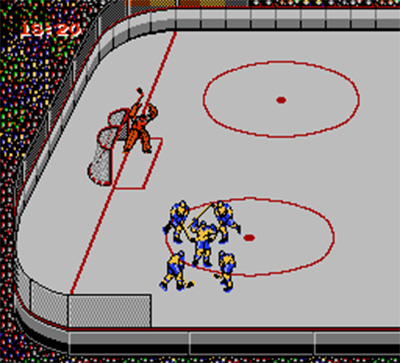
1. Blades of Steel ( NES, 2-player )
Match scoring: Highest score after 1 period wins a match, ties lead to sudden-death overtime periods
A tight and focused classic hockey game with surprising depth. Only after playing it competitively did we come to realize that players have control over nearly every aspect of their team: the positioning of the goalie, the angle of shots on goal. This ended up being the surprise favorite of the night; we will definitely be playing more Blades in the future.
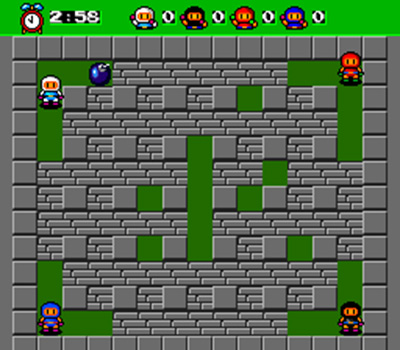
2. Bomberman '93 ( TurboGrafx-16, 4-player )
Match scoring: One first-to-five-wins match, players ranked by number of wins
Multiplayer Bomberman games are famous for being exciting and chaotic. This entry is a great execution of the core Bomberman experience: blow up walls, collect ability-boosting items, and chain explosions unexpectedly to kill your friends. We played the Wii Virtual Console port, which allows you to play with up to five(!) players. It's not quite the madness of 10-player Saturn Bomberman, but it also doesn't require any multi-taps.
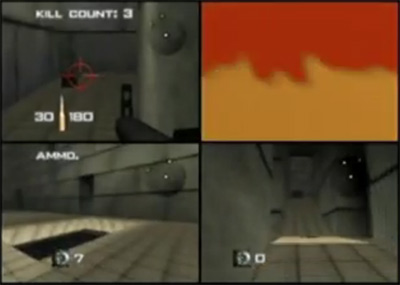
3. Goldeneye 007 ( N64, 4-player )
Match scoring: Ranked by game in five-stock deathmatches
Sadly, the ravages of time have not done this game any favors. What was once remembered fondly as a fast and furious split-screen shooter is now a muddy and nearly unplayable mess. There's a very fun and rewarding game here, but it's obscured by choppy framerates and chunks of shattered nostalgia. Despite these issues, it is unquestionably a classic that laid the foundation for modern console shooters.
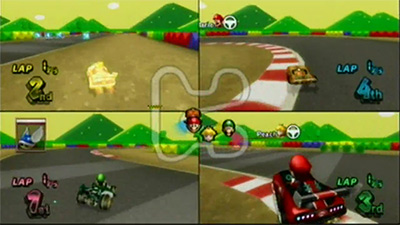
4. Mario Kart Wii ( Wii, 4-player )
Match scoring: Ranked by game in VS. racing mode, motion control only
The latest iteration of Nintendo's venerable kart racing franchise is ostensibly a party game. Laggard-assisting items level the playing field, giving those in last place they ability to rain hell upon those in the lead. The items are far from balanced or fair, but they contribute to perpetuating a sense of being in the center of a hectic free-for-all. All the players groaned when I made them exclusively use motion control, but they're all whining babies.

5. Super Monkey Ball 2: Monkey Target ( Gamecube, 4-player )
Match scoring: Ranked by total points in 3-round matches
Super Monkey Ball 2 is an excellent single-player game, but the unlockable multiplayer minigames will keep you playing with your friends long after you've forgotten it. Our favorite is Monkey Target, which involves launching monkeys off of huge ramps and attempting to glide them onto the most point-laden targets. The targets, incidentally, are floating in the middle of the ocean: If you miss, your monkey drowns in a watery grave. Fun!
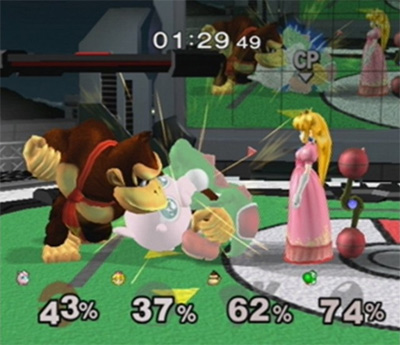
6. Super Smash Bros. Melee ( Gamecube, 4-player )
Match scoring: Ranked by game in 5-stock matches, auto-handicap turned on
With tighter gameplay than its descendant Brawl, Melee retains is place as the greatest 4-player fighting game of all time. The controls are simple yet deep, resulting in highly chaotic games of cat-and-mouse. Some of our competitors had more recent experience with Melee than others, so I opted to turn on the auto-handicapping feature. It didn't help much.
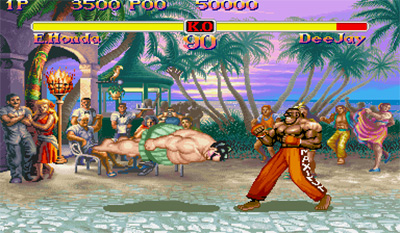
7. Super Street Fighter 2: The New Challengers ( Arcade, 2-player )
Match scoring: Standard first-to-two-KOs match rules
No competitive tournament would be complete without a Street Fighter game. I chose an older version to keep participants on their toes, which worked fairly well -- every match was a nail-biter. The use of an authentic X-Arcade joystick didn't hurt, either.
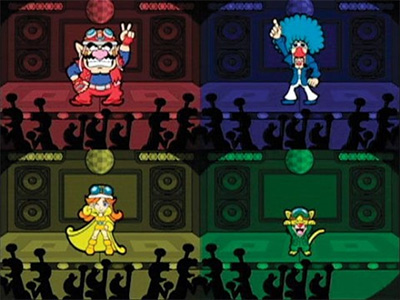
8. Warioware, Inc: Mega Party Game$! ( Gamecube, 4-player )
Match scoring: Survival Fever, ranked by game
WarioWare is the unsung hero of party gaming. Players are thrown into rapid-fire 2-second "microgames" where the main challege stems from figuring out what the hell it is you're supposed to do. It's wacky, it's imaginative, and it's a parody of videogaming itself. My favorite mode, Wobbly Bobbly, involves playing microgames and balancing a stack of turtles that grows as you lose games. It was sadly locked due to a corrupted memory card, so we played the more vanilla Survival Fever instead.
SURPRISES
I love the idea of having an idiosyncratic secret final game. This game would be the wildcard: worth double the points of any of the other games, giving lagging players a chance to catch up. I probed the depths of my gaming library to find something that no one would ever be able to predict, and I found it.

BONUS GAME: QBasic Gorillas ( PC/DOS, 2-player )
Match scoring: First to 2 points
This game was distributed with copies of DOS 5.0 as an example of what you could accomplish with the QBasic programming language. Its gameplay is stunningly simple: you enter two numbers. The first is the angle at which you want to hurl a banana, the second is the velocity at which you want it to travel. The banana sails through the air, its trajectory affected by gravity and the wind. Players take turns entering angle/trajectory values until one of them is hit ( and oddly, exploded ) by a banana.
That's it.
It's a bare-bones distillation of competitive gaming, but it can nonetheless lead to a surprising amount of tension. Watching a banana slowly reach the apex of its arc as you attempt to calculate how you should change your values on the next round is genuinely thrilling, in a nerdy sort of way.
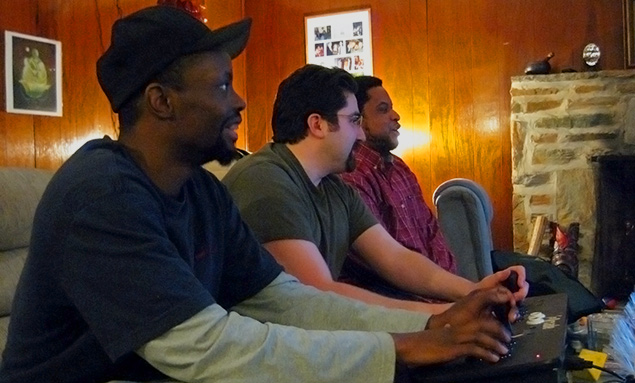
RESULTS AND LESSONS LEARNED
In the end, everyone had a great time. The rankings weren't quite as close as I had planned, but I didn't tally them up until the end so they didn't have any bearing on the event itself. There were probably two or three games more than necessary on the schedule, so if I was to run another tournament it would likely have a slightly shorter game list.
We all play games together as our de facto method of hanging out, but we rarely play them in a truly competitive spirit. It's typical to forget who won or lost a given game right after the victory screen is displayed. This tournament changed that dynamic, and I think it's something I'd like to explore further -- with ALL of my best men. |
|
|
|
|
|
|
|